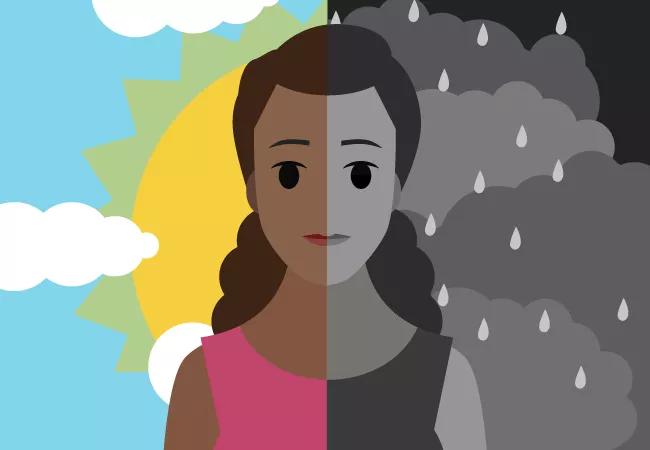Discover the facts about this brain illness

Image content: This image is available to view online.
View image online (https://assets.clevelandclinic.org/transform/de4667ef-c5dc-460d-a568-4ff9ecfdcb83/bipolar-disorder_png)
Bipolar Disorder
Swinging wildly between euphoria and depression. Psychotic breaks. That’s how many people view bipolar disorder.
Advertisement
Cleveland Clinic is a non-profit academic medical center. Advertising on our site helps support our mission. We do not endorse non-Cleveland Clinic products or services. Policy
But the reality is quite different, says psychiatrist Amit Anand, MD. Here, he upends common misconceptions about the brain disorder:
“Many people believe that those with bipolar disorder are out of control and psychotic,” says Dr. Anand. “But we have learned over the last few decades that milder forms of bipolar disorder are much more common.”
The two main types of bipolar illness are bipolar I and bipolar II. Beyond that, bipolar illness takes many forms.
“Thus, most people with bipolar disorder live in the community and may never be admitted to a psychiatric hospital,” says Dr. Anand.
“Mood swings happen for many different reasons, including the weather, the menstrual cycle, common medications like steroids, and substance use,” says Dr. Anand.
Moodiness can also occur with medical illnesses such as hormone disorders, autoimmune diseases and neurological problems.
Advertisement
And mood swings occur with other brain illnesses, such as attention-deficit hyperactivity disorder (ADHD) and certain personality disorders.
What sets bipolar disorder apart? “The illness represents a change from the usual self,” explains Dr. Anand. “Also, depression lasts for several weeks at a time, and mania lasts for several days at a time. We look for a season of summer — not one hot day.”
People often assume that in bipolar disorder, periods of mania alternate regularly with periods of depression.
“In bipolar disorder, mood is more often chaotic, with random combinations of symptoms,” says Dr. Anand. “It is not cyclical.”
This helps fuel the turmoil that often unravels relationships with family, friends and coworkers — even in mild cases of bipolar disorder.
That is why treatment is so important.
“We have very, very effective treatments for bipolar illness,” says Dr. Anand. “Patients generally respond well to mood-stabilizing drugs, sometimes combined with antidepressants and/or drugs for mania.”
Psychotherapy is always recommended, he says, and offers many benefits by:
If you suspect that you or someone you love may have bipolar disorder, get a full evaluation from a psychiatrist.
“Too often, bipolar disorder is not diagnosed, or it is mistaken for another problem,” says Dr. Anand. “Get one good diagnostic evaluation. Then, know that some very effective treatments can help you lead a normal life, like anyone else.”
Advertisement

Sign up for our Health Essentials emails for expert guidance on nutrition, fitness, sleep, skin care and more.
Learn more about our editorial process.
Advertisement
Fishing for compliments, provoking conflict and pouring on the melodrama are all ways of expressing an unmet need
By setting boundaries around how much you give, you can save your time and resources while also being a good person
Certain B vitamins, omega-3 fatty acids and a healthy diet can serve as complementary treatments for schizophrenia
Following your treatment plan, finding a community, staying active and maintaining a healthy diet can help manage this psychiatric condition
Whether it’s playing hooky or faking cancer, malingering behavior is always motivated by personal gain
Causes range from psychological conditions like PTSD to physical conditions like fibromyalgia
Always putting others’ happiness before your own can build resentment over time
Emotional changes, isolation and unusual behavior could signal the onset of the condition
Although it could be used as a moisturizer, this new trend is not recommended
Communicating clear limits helps protect your time, energy and emotional well-being
High cholesterol can be genetic, but testing and treatment can lower your heart disease risk